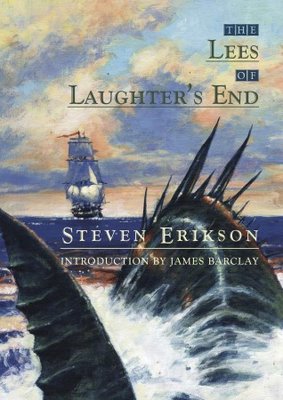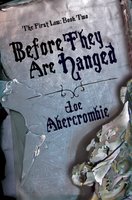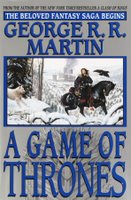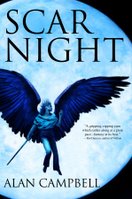A little over a week ago, M. John Harrison posted his thoughts pertaining to worldbuilding on his
blog. Here is what he had to say:
Every moment of a science fiction story must represent the triumph of writing over worldbuilding.Worldbuilding is dull. Worldbuilding literalises the urge to invent. Worldbuilding gives an unneccessary permission for acts of writing (indeed, for acts of reading). Worldbuilding numbs the reader’s ability to fulfil their part of the bargain, because it believes that it has to do everything around here if anything is going to get done.Above all, worldbuilding is not technically neccessary. It is the great clomping foot of nerdism. It is the attempt to exhaustively survey a place that isn’t there. A good writer would never try to do that, even with a place that is there. It isn’t possible, & if it was the results wouldn’t be readable: they would constitute not a book but the biggest library ever built, a hallowed place of dedication & lifelong study. This gives us a clue to the psychological type of the worldbuilder & the worldbuilder’s victim, & makes us very afraid.
This insightful nugget of elitism was brought to our attention by Larry (Dylanfanatic). By posting this I'm in no way taking a jab at Larry. I have a lot of respect for Larry, but we just happen to disagree on this issue. And judging from the responses his post generated on both
wotmania.com and
westeros, it seems that I'm not the only one. I just wanted to bring this to the attention of a broader audience and see what everyone thought about this.
Let me begin by stating that I'm not one of those fans who sees Harrison's novels as a "crock of shit," as they put it. I respect the author and his work, but you'll never see me running to the bookstore when he releases a new book. Moreover, I do feel the man is a bit overrated. But that's just my opinion, and it's worth is relative.
My first beef with M. John Harrison stemmed from this quote:
I think it's undignified to read for the purposes of escape. After you grow up, you should start reading for other purposes.
So it's escapism for some, myself included. I don't know if Mr. Harrison realizes that a vast majority of speculative fiction's readership is drawn to the genre for escapism. Food for thought. . . To members of the literati and to those who like to hear themselves talk, this sort of quote might bring out a condescending chuckle or two. And yet, by making such a claim you will also alienate a good chunk of potential readers, as they will, understandably, reject his way of thinking.
And now Mr. Harrison returns with this bit about worlbuilding and how afraid we should be of this aspect.
As I mentioned on wotmania.com, he sounds like a midlist author extremely jealous of the popularity and sales of the epic fantasy novelists. Epic fantasy is what's "in" at the moment, and worldbuilding plays a major role in this sub-genre. If he can't compete with Jordan, Martin, Erikson, Bakker and company in that regard, he shouldn't try to validate his stance by belittling the worldbuilding aspect of novels. This elitist postulation will get him nowhere, and I feel it's a bit unbecoming of an author of his caliber to come out and make such a claim. If I may be so bold, he sounds like a cry-baby. . .
I disagree with Harrison's post, and I don't understand why worldbuilding and good writing are viewed as being mutually exclusive. To me, prose, like worldbuilding and characterization, is just one element that comprise a good novel. Furthermore, prose is by no means the most important aspect of what constitutes a great novel, just one piece of the puzzle. No SFF work can stand on the sole strength of worldbuilding. Harrison's post is preposterous in that sense. And prose, no matter how impeccable and fantastic, cannot carry a story.
For in the end, it's all about the stories. I see authors/novelists more as storytellers, for that's the legacy they leave behind when a book/series is published. No one really remembers Tolkien's prose. Of course not, unless you're an English teacher or a literature grad student. What most of us remember is Frodo's quest. Prose didn't make
The Lord of the Rings sell more copies than
The Bible. The story of Bilbo, Frodo, Gandalf, and company did.
Similarly, during the 80s authors such as Stephen R. Donaldson, David Eddings, Raymond E. Feist, Terry Brooks, and Margaret Weis and Tracy Hickman left indelible marks on the fantasy genre. With the exception of Donaldson, no one in that group has ever been commended for their prose. Be that as it may, their tales captured the heart and imagination of millions of fans around the world. Eddings once said in an interview that he was in no danger of ever winning a Nobel Prize for literature. At last count, the man had sold over 18 million copies worldwide, so I figure he got over it. What about the undisputed master, Frank Herbert? Does
Dune suck because it is a feat of worldbuilding, characterization, prose and a panoply of mind-blowing storylines?
Since the mid-90s writers such as Robert Jordan, Neil Gaiman, George R. R. Martin and even Terry Goodkind (yes, it's undeniable!) have made the fantasy genre more popular than it has ever been. Not to mention J. K. Rowling, the most popular author on the planet. Their series will continue to sell long after they're dead and gone. It's no secret that worldbuilding has become more important in the last few years, and series such as
The Wheel of Time,
The Malazan Book of the Fallen,
The Book of All Hours,
A Song of Ice and Fire, and many others continue to raise the bar even higher. As a fan of the genre, I say, "Bring it on!" There has never been that many gifted SFF authors all writing at the peak of their careers at the same time, and fans should rejoice -- not be afraid. That readers are torn by the decision to save and spend their hard-earned money on the next Bakker, Hobb, Erikson, Lynch, Duncan, Kay, Hamilton, or a multitude of other talented writers out there, this can be nothing but a good thing.
If Harrison can only fall back on his prose to compete against writers who can create deep and believable characters, a vivid setting and a gripping and multilayered plot, doing it all with nice prose to boot, then he can never hope to produce works that will surpass those of his peers. Which, sadly, appears to be the case here. Hence Mr. Harrison's post.
Speculative fiction as a genre is in constant evolution, whether one likes it or not. And one cannot stop evolution. You can write for the literati and the purists, and your sales will accordingly be tepid. Be afraid of worldbuilding, you say? I say be afraid of falling into obscurity if you fail to realize what fans want. There is nothing wrong with going against the grain and doing what strikes your fancy. As an author, one must do what's in his or her heart. That's artistic integrity. But if you refuse to be mainstream, don't bitch and moan because other, more successful authors outsell you by a margin of a thousand to one or more. . .
Adam (Werthead) nailed it right on the head when he said,
But I find an author who hurls around these generalisations without actually being any better himself to be verging on the hypocritical.
I invite M. John Harrison to put his money where is mouth is. If he can write a novel with no worldbuilding whatsoever, in which the prose is such that it will stir my soul, make me wet my pants and bring tears to my eyes, he'll prove me wrong. If he ever succeeds in that endeavor, I'll gladly give his book a perfect 10 and spread the word far and wide about how incredible he is.
Until then (and I'm not holding my breath), I will continue to enjoy the works of those pitiful wretches whose novels use worldbuilding to such an insulting degree. What can I say? My fellow dumbasses and I like writers such as Tad Williams, Scott Lynch, Robin Hobb, Robert Jordan, Hal Duncan, yada yada yada.
My post is a bit harsh, I know. Those who sometimes think I'm too nice should be pleased -- by the way, you guys should talk to the people in my entourage!;-) I'm not certain this was his intention, but M. John Harrison's assertion comes out as a slight to both readers and authors who particularly like the worldbuilding aspect of a book. As Ken (Kcf) mentioned, it comes across as an underhanded insult and I find that off-putting to say the least.
Still, that's just me. Do peruse both message boards to see what sort of replies Larry's post generated, and feel free to leave your thoughts in the comment section.


























